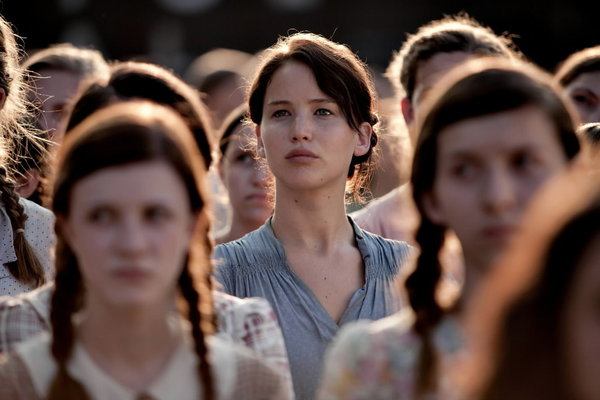Not without fanfare, Katniss Everdeen has taken her place in a pop culture lineage of new-millennial vintage. Like Harry Potter and Bella Swan before her, the protagonist of “The Hunger Games” transfers from the pages of young-adult fiction to the big screen as nothing less than a pre-engineered box-office phenomenon. And as with all such YA juggernauts, the merits of the first adaptation of novelist Suzanne Collins' trilogy are debatable (and for many fans, beside the point).
Less in doubt is Katniss' place at the forefront of a growing number of movie characters who happen to be tough young women and who don't need to be rehabilitated for it.
From the no-nonsense muscularity of her name to her peerless skills as an archer, Katniss (portrayed by Jennifer Lawrence) is an avatar of strength and purpose — without the once-requisite "for a girl" qualifiers. That's no small thing in an age of Kardashians as role models (one of Collins' most penetrating conceptions is the way "Hunger Games" pushes reality TV inanity to the darkest extreme), or at a time when even educated people still use such antediluvian phrases as "woman doctor."
It also marks the stirrings of a potential sea change for Hollywood, which in recent decades has tended to punish female independence or temper it with the ribbons and bows ofromantic bliss.
Even among the frillier and more tradition-steeped of this emerging band of heroines, girls are engaging in hand-to-hand combat as they take on injustice, hypocrisy and all-around evil. Whether they're ordinary girls thrust into extraordinary circumstances or princesses cast out of the castle, they're not waiting for a shiny-armored knight to save the day.
No less an iconic princess than Snow White is flexing muscle in her latest big-screen incarnations, one of which finds Kristen Stewart transitioning from Bella's mooning and swooning in the "Twilight" series — essentially a gothicized romance novel — to an action hero. They're in works of disparate tone, but Lily Collins' Snow White in the recently released "Mirror Mirror" and the one played by Stewart in the upcoming "Snow White and the Huntsman" are both evolutionary leaps from the folk-tale character's angelic passivity. Righteous and wronged, Grimm's Snow White spends a considerable length of time preserved in a glass coffin — "as still as a gold piece," as the poet Anne Sexton described her.
Such suspended animation is not a viable option for Katniss, who's forced into gladiatorial combat. But even for characters facing less violent coming-of-age struggles, sitting pretty is not an option. The headstrong teen at the center of the summer release "Brave," a cartoon princess who's also an archer, "challenges destiny to change her fate."
And in "Pennyroyal's Princess Boot Camp," a book optioned for the screen by Reese Witherspoon, girls learn to be warriors, the better to battle a coven of wicked witches. No doubt they're picking up the fiery baton of grass-roots grrl power, but rocking a crinoline and tiara isn't enough for today's princesses.
In our fictions, if not in our tabloids, to be blinged out is to be less than genuine. Katniss, defined by her unwavering inner compass and not her appearance, stands in opposition to those who worship at the church of fashionable conformity and celebrity-branded consumerism.
It's not merely because she lacks the means to indulge, but because she has the intelligence and self-possession to see through the vanity. The garishly girlie Effie Trinket is her antithesis. Humanized on the pages of "Hunger Games," she's a gargoyle of a government stooge in Gary Ross' film, portrayed by Elizabeth Banks with the frenzied emptiness that puts Katniss' old soul in sharp relief.
These girls grow up fast. "Huntsman" costume designer Colleen Atwood has said that her guiding concept was "someone who is tough and who had had a journey already at a very young age." That notion of hard-earned wisdom so early in life is the essence of Katniss Everdeen, a character famously summarized by another as "sullen and hostile."
It's hardly an unusual description for a 16-year-old girl, but the particulars of Katniss' situation turn an intended insult into a compliment of the highest order. How else would a thinking, feeling person respond to the realities of a brutal, authoritarian state and a devastated home front? Katniss' unsentimental edge is her most striking quality, more so in Collins' books than in the first installment of the four-movie franchise. She's a hunter, in sync with nature, her instinct for survival a rebuke to the cruelty of the man-made world. And although she's guarded, she hasn't lost the capacity for kindness.
Her maternal side — though she would cringe to hear it described that way — is expressed primarily in her tenderness toward younger children, not in a fussy way but with a sturdiness that's grounded and reassuring. It's one of Katniss' chief strengths and surely her most poignant.
Like the Ozark teen Lawrence played in"Winter's Bone,"she had to step into the void left by a father and a mother's inability to cope. She does it without complaint, even as she's fueled by anger. She possesses a marrow-deep understanding of the rottenness that surrounds her and is understandably wary.
For characters facing life-defining tests, like Katniss, such suspicion is key to self-preservation. It can also be a defining strategy of adolescence, a way of gauging not just external truth but personal identity, which is no doubt a big part of why the "Hunger Games" books have connected so resoundingly with tweens and teens, both male and female.
Translated from inner monologue to onscreen action, Katniss' untamed quest for justice has lost some of its potency, which is no surprise in an event movie like "Hunger Games." The risk remains that Katniss — and her inevitable imitators — could turn into distaff versions of gunslinger cliches, their distinct fury traded in for a more generic and accessible brand.
The outrage that drives unlikely Katniss compatriot Lisbeth Salander, aka the girl with the dragon tattoo, has so far defied reduction in the move from bestsellers to screen (particularly in the ferocity of Noomi Rapace in the trilogy of Swedish films). Lisbeth is by no means a YA heroine, but she is, like Katniss, an unprecedented creation of take-no-prisoners intensity. And she, too, is a kind of hunter in a world gone mad.
For this new breed of young female characters, the serious business of resisting malevolent or controlling forces is not all dystopian doom, however, and it doesn't have to express itself in stoicism, ruthlessness or murderous rage.
There's magic, too, in those trials and tribulations. Emma Watson's Hermione Granger in the "Harry Potter" films might not seem an obvious precursor of Katniss — the former a wand-wielding witch to the latter's coal miner's daughter. But she, more than the adolescent killing machines of"Hanna" and"Kick-Ass," is a paradigm of strength in conflicted emotional territory.
Hermione never tunes out her braininess for the sake of being more unthreateningly "ladylike" or less annoying, no matter how many rolled eyes she provokes. She stands her ground, learns to focus her exceptional powers and proves essential to Harry's, and Hogwarts', epic struggle against darkness.
Hermione finds romance, too, but it's not the grand prize that satisfies all her longings. And when Collins makes romantic yearning a key thread in"The Hunger Games,"she gives it a postmodern twist by adding layers of reality-TV performance and self-awareness: young love as both media fodder and real awakening. But romance sells, and in the big-screen version that angle is sweetened, its edges smoothed, even if Katniss isn't awaiting a princely kiss as the final, puzzle-solving piece of her story.
From her ravaged future world, Katniss arrives in the multiplex as a fresh emblem, if not a fully realized cinematic creation. Through the books, she already has staked a claim in the imaginations of girls and boys, women and men. And for now, she holds the mainstream movie spotlight as a vision of youthful defiance — feminine, unorthodox and unapologetic.
.gif)




.jpg)


